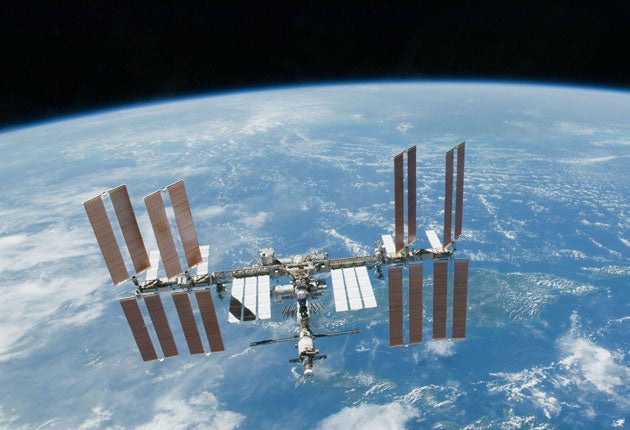Ten years on, and still the brightest light in space
The International Space Station flies over the UK tonight, so keep your eyes peeled

If you look to the heavens between sunset and moonrise tonight, at 6.20pm in London, the brightest object you'll see (assuming it's not cloudy) will be a white spark racing the wrong way across the sky, from west to east. To the naked eye, the International Space Station, humanity's toehold on the edge of the vast reaches of the cosmos, is easier to see than Venus.
This is not some cramped canister like Mercury or Apollo, where every movement must be carefully choreographed. The ISS is more an artificial island in space than a ship; its 14 modules have more elbow room than a five-bedroom house. Together with its 20 solar power panels, it could stretch the length of a football pitch, weighs as much as 330 cars, and is zooming 230 miles above your head at 17,000mph.
Since America's William Shepherd and Russian cosmonauts Yuri Gidzenko and Sergei Krikalev first floated through the Zvezda module 10 years ago last Tuesday, nearly 200 astronauts, cosmonauts and mission specialists from 15 countries have called the ISS home. Four were born in the UK, though parsimonious Britain is not involved in the project. These crews have conducted 150 spacewalks and 600 experiments. And apart from the 2003 crash of Columbia, it has all gone so smoothly that hardly anyone notices any more.
Its success is encouraging in these days of budget cuts, since it emerged as a compromise when the US, Russia, Europe and Japan found they could not afford four separate space stations. Supporters love to hold it up as an example of international co-operation. But it has not been without hiccups. The final component won't be nudged into place until next year, eight years behind schedule, just as Nasa's space shuttle programme ends.
Whether the ISS, the most expensive object ever built, is worth $100bn is a contentious issue. Proponents point to the science, though they refuse to place a value on it, arguing that much of the return will come in the future. Critics note that a lot of the research has been into ways people can live in space, knowledge that's of use primarily if manned space programmes continue.
The ISS will fly for another decade, and may serve as a staging post to the Moon. Until then, perhaps its greatest contribution is as an inspiration, reminding us how high we can aspire.
Subscribe to Independent Premium to bookmark this article
Want to bookmark your favourite articles and stories to read or reference later? Start your Independent Premium subscription today.

Join our commenting forum
Join thought-provoking conversations, follow other Independent readers and see their replies